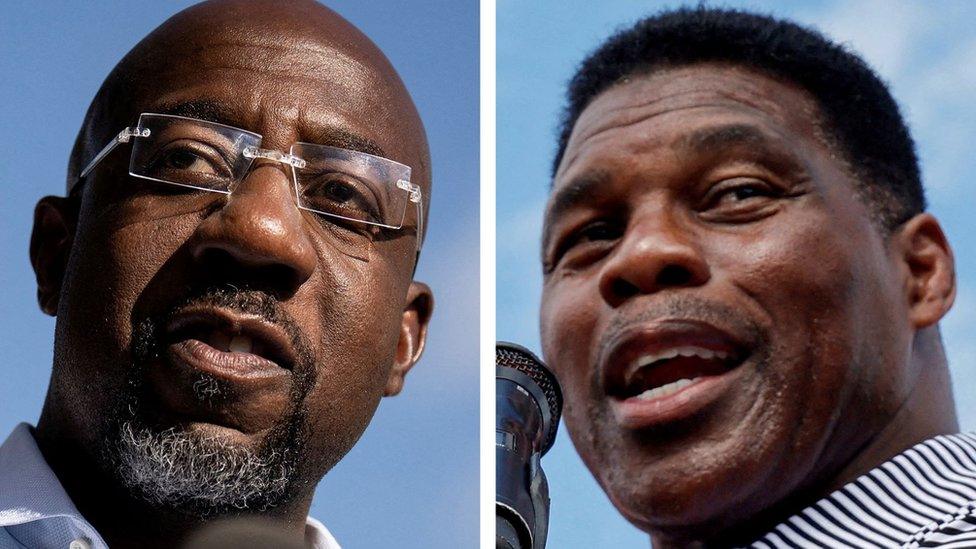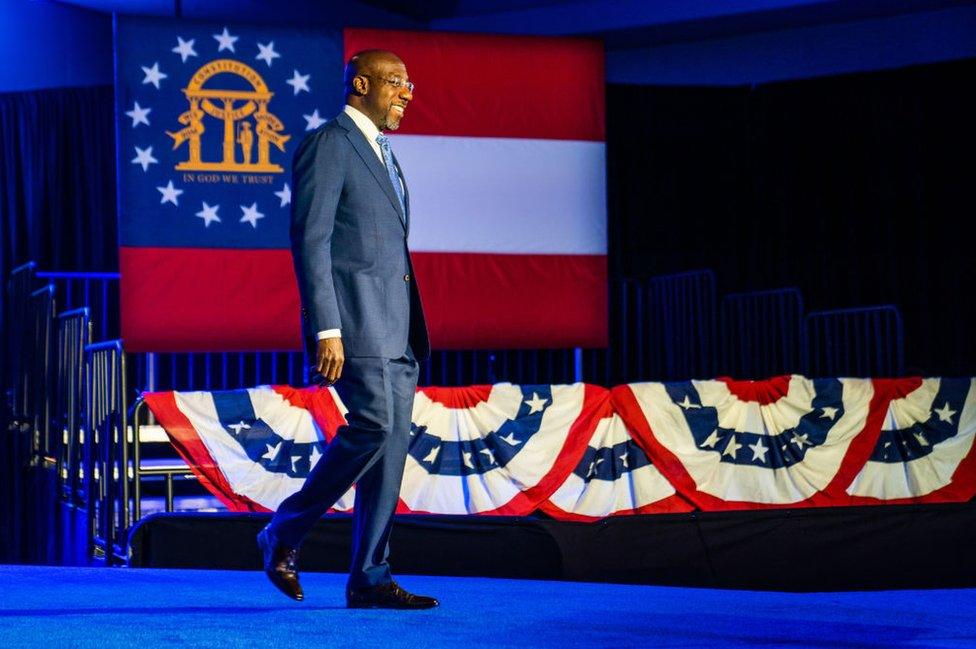Georgia run-off election: Ready to switch off from politics? Not here
- Published

Three days after the US voted, most of America is ready to switch off from politics. That's not an option in Georgia, where the next high-stakes election campaign is already under way.
"It feels like we have elections every other month!"
Libby Hickson's response probably reflected how many in the state felt when they learned that their contest for US Senate was going to a second round.
But as she cheered at a campaign rally for Democrat Raphael Warnock on Thursday, the 51-year-old native of Marietta said she was fired up to vote again on 6 December. She even planned on volunteering at a local precinct.
News of the run-off elicited a range of responses, from excitement, to resignation, to a dark humour about having to endure four more weeks of politicking.
Scott Strickland just wanted the ads to stop. For the past several months, the 59-year-old grocery store owner from Gainsville, Georgia, has been bombarded with "nasty" political advertisements for this year's US Senate race. On the car radio. On the TV. Before YouTube videos.
"You just get a real bad taste in your mouth, from both sides," said Mr Strickland, a conservative who voted for the Republican Herschel Walker and planned to do so again next month.
In Tuesday's midterm election, Mr Warnock came within a few thousand votes of outright victory. He won 49.4% of the vote, while his Republican opponent garnered 48.5% (a libertarian candidate received 2.1% of the votes).
"We all knew this election was close," Mr Warnock told dozens of poncho-clad, umbrella-wielding supporters who weren't letting a mild Atlanta downpour dampen their spirits. "But I've done this before. We've done this before! We know how to win a run-off!"
The crowd cheered him on with chants of "One more time! One more time!"

Warnock thanks supporters on election night
They say history repeats itself, but rarely does it do so on such a brief timetable.
Less than two years ago, in January of 2021, Georgia held a landmark run-off in a special election that sent Mr Warnock to the US Senate for a temporary term. The stakes in that election were nothing short of Democratic control of the Senate, and President Joe Biden's legislative ambitions. The contest became an object of national obsession.
Now, Mr Warnock is running for a full six-year Senate term, and once again, he must win a run-off to secure his seat. Once again, the fate of the US Senate potentially rests in the balance.

Where the race stands now
Senate control hinges on the outcome of three states - Arizona, Nevada - and Georgia
Democrats need to win two of those three to retain their grip
Republicans are inching closer to a 218-seat majority in the House
But the projected number of seats is dimming


Mr Walker, meanwhile, gets a second attempt at victory after coming in roughly 40,000 votes behind Mr Warnock in the first round of the election.
His campaign has wasted no time in hitting the ground. A high-profile Republican US Senator from Texas, Ted Cruz, travelled to the state on Thursday. The National Republican Senate Committee also announced their first television advertisement - which at some point, like it or not, Mr Strickland will probably have to watch.

Walker rallies supporters
Martha Zoller, a Republican strategist and radio host in the state, said a number of variables could impact the race, including what happens in Arizona and Nevada's Senate races.
"I think it will depend upon if it's for a balance of the Senate," she said. Ballots are still being counted in those two states and the outcome there could either secure the Senate for Democrats or put the stakes squarely on Georgia's shoulders.
Ms Zoller also alluded to the fact that former President Donald Trump, a Republican, has hinted he will announce another presidential run in mid-November, which would throw a political bombshell back in the national conversation in the midst of Georgia's run-off election.


Mr Trump's attempts to meddle in Georgia's 2020 presidential election and sow disinformation about his loss are widely blamed for helping deliver Georgia's two US Senate seats to Mr Warnock and another Democrat, Jon Ossoff.
Amid all these factors, voters will be asked to return to the ballot box in just four weeks, with early voting starting at the end of November.
Despite having to go through the electoral process again, they told BBC News they saw it as their civic duty to see the election through.
Simone Smith, 39, had voted for Democrats Stacey Abrams in the gubernatorial race, and Mr. Warnock in the Senate race. Ms Abrams lost, but Ms. Smith, an immigrant from the United Kingdom, saw it as a privilege to be able to return to the polls again on 6 December.
"I personally don't have fatigue," Ms. Smith, who works in the tech industry, said. "For me, existing in this country and having the ability to vote is pretty much the immigrant story. I spent 18 years of my life without citizenship, to finally get to that place in 2018 and get my citizenship, I'm going to exercise my right to vote in all races."